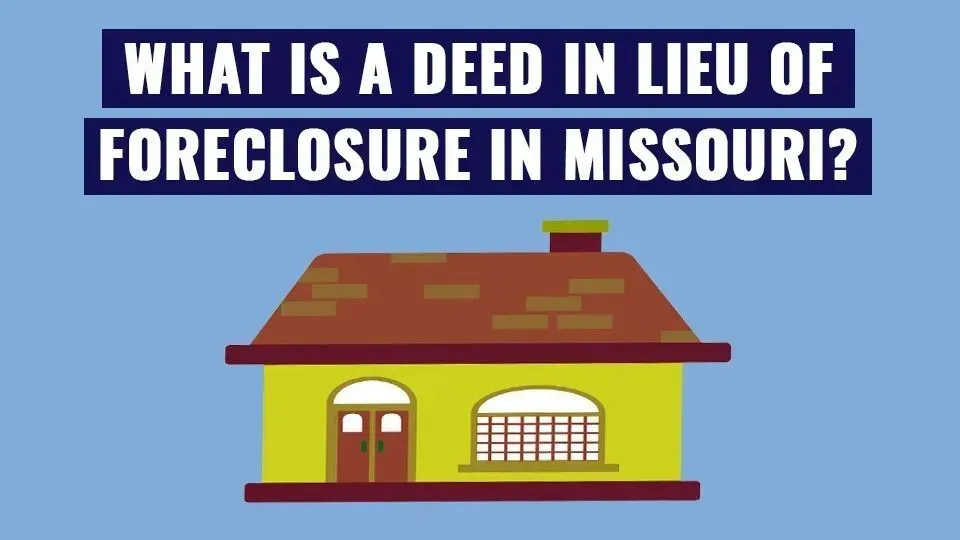What Is a Deed in Lieu of Foreclosure in Missouri?

Foreclosure is a daunting process that no homeowner wants to face. However, circumstances can sometimes make it difficult to keep up with mortgage payments, leading to the possibility of foreclosure.
In Missouri, there is an alternative option called a “deed in lieu of foreclosure” that homeowners can consider. By understanding this option, you can make an informed decision about your financial situation and potentially avoid the negative consequences of foreclosure. There are also other alternatives if you need to sell your house to avoid foreclosure in Missouri.
How Does Foreclosure Work in Missouri?
Foreclosure is a legal process that allows a mortgage lender to take possession of a property when the homeowner fails to make mortgage payments. In Missouri, the foreclosure process typically involves the following steps
- Notice of Default: When a homeowner falls behind on mortgage payments, the lender will send a notice of default, informing them of their delinquency and the consequences if the payments are not made.
- Foreclosure Lawsuit: If the homeowner fails to resolve the delinquency, the lender may file a foreclosure lawsuit, initiating the legal proceedings.
- Public Auction: After obtaining a judgment of foreclosure, the lender will schedule a public auction to sell the property to recover the outstanding mortgage debt.
- Sheriff’s Sale: At the public auction, the property is sold to the highest bidder. If no one bids, the lender takes ownership of the property.
Common Circumstances That Lead to Foreclosure
While foreclosure can be a distressing situation, understand the common circumstances that can lead to it. By identifying these factors, homeowners may be able to take proactive steps to avoid foreclosure or explore alternatives. Here are some common circumstances:
Job Loss
A sudden loss of employment can significantly impact a homeowner’s ability to make mortgage payments. Without a steady income, it becomes challenging to meet financial obligations, including the monthly mortgage installment. If you find yourself in this situation, contact your lender immediately to discuss potential solutions.
Financial Hardship
Financial hardships can arise from various factors such as unexpected medical expenses, divorce, or overwhelming debt. When faced with overwhelming financial burdens, homeowners may struggle to keep up with mortgage payments, leading to potential foreclosure.
The Mortgage Is Upside Down
An upside-down mortgage occurs when the homeowner owes more on the mortgage than the current value of the property. This situation often arises during economic downturns or when property values decline. An upside-down mortgage can make it difficult to sell the property and repay the mortgage debt, increasing the risk of foreclosure.
Late Mortgage Payments
Consistently making late mortgage payments can put homeowners at risk of foreclosure. Late payments not only incur additional fees and penalties but also negatively impact credit scores.
Adjustable-Rate Mortgages (ARMs)
Adjustable-rate mortgages (ARMs) can be risky for homeowners, especially if the interest rates increase significantly. When the interest rates rise, the monthly mortgage payments can become unaffordable, increasing the likelihood of foreclosure. Homeowners with ARMs should closely monitor interest rate fluctuations and plan accordingly.
How Does Foreclosure Affect Homeowners and Lenders?
For homeowners, foreclosure can result in the loss of their property, damage to their credit score, and difficulties in securing future loans. The foreclosure process can stay on your credit report for seven years, making it challenging to qualify for favorable interest rates or obtain new credit.
Lenders are also impacted by foreclosure. They may incur significant legal costs during the foreclosure proceedings and may not recover the full amount of the outstanding mortgage debt through the sale of the property. Foreclosure can result in a longer recovery period for lenders to recoup their losses.
What Is a Deed in Lieu of Foreclosure?
In Missouri, a deed in lieu of foreclosure is an alternative option that homeowners facing foreclosure can consider. It involves voluntarily transferring the property title to the lender in exchange for the cancellation of the mortgage debt. By accepting a deed in lieu, the lender avoids the lengthy foreclosure process, and the homeowner can avoid the negative consequences of foreclosure.
The deed in lieu of foreclosure process generally involves the following key elements and legal requirements:
- Mutual Agreement: Both the homeowner and the lender must enter into a mutual agreement to proceed with a deed in lieu of foreclosure.
- Voluntary Surrender: The homeowner voluntarily surrenders the property, transferring the title to the lender.
- No Other Liens or Judgments: The property should not have any other liens or judgments, ensuring a clean transfer of ownership.
- Financial Situation Assessment: The lender will typically assess the homeowner’s financial situation to determine if a deed in lieu is an appropriate solution.
- Release of Liability: Once the deed in lieu is executed, the lender releases the homeowner from any further mortgage obligations.
What Are the Benefits of a Deed in Lieu of Foreclosure?
A deed in lieu of foreclosure offers several benefits for both homeowners and lenders. Here are some key advantages:
- Avoid Foreclosure: By voluntarily transferring the property to the lender, homeowners can avoid the lengthy and stressful foreclosure process.
- Preserve Credit Score: While a deed in lieu can still have some impact on credit scores, it is generally less damaging than a foreclosure. This allows homeowners to recover financially more quickly.
- Quicker Resolution: The deed in lieu process can often be completed more swiftly than foreclosure, providing a faster resolution for both parties.
- Potential Debt Forgiveness: In some cases, lenders may forgive the remaining mortgage debt as part of the deed in lieu agreement, providing homeowners with a fresh start.
What Are the Drawbacks of a Deed in Lieu of Foreclosure?
While a deed in lieu of foreclosure can be a beneficial option, there are also potential drawbacks to consider. Here are some key points to keep in mind:
- Impact on Credit Score: Although a deed in lieu is generally less damaging than foreclosure, it can still have a negative impact on credit scores, making it harder to obtain future loans or favorable interest rates.
- Potential Tax Consequences: The cancellation of mortgage debt through a deed in lieu agreement may be considered taxable income by the IRS. Homeowners should consult with a tax professional to understand the potential tax implications.
- Loss of Equity: By transferring the property to the lender, homeowners forfeit any equity they may have built in the property.
- Obligation to Accept: Lenders are not obligated to accept a deed in lieu of foreclosure. They may reject the offer if they believe it’s not in their best interest.
How to Negotiate a Deed in Lieu
Negotiating a deed in lieu of foreclosure requires open communication and cooperation between the homeowner and the lender. Here are some key strategies to consider:
- Contact Your Lender: Reach out to your lender as soon as you realize you may be facing difficulties in making mortgage payments. Explain your situation and express your willingness to explore alternatives, including a deed in lieu.
- Provide Financial Documentation: Prepare and provide the necessary financial documentation to support your case, such as proof of income, expenses, and any hardship circumstances.
- Seek Legal Advice: Consult with a real estate attorney or housing counselor who specializes in foreclosure prevention. They can guide you through the negotiation process and ensure your rights are protected.
- Cooperate with the Lender: Be responsive and cooperative throughout the negotiation process. Respond promptly to any requests for information or documentation from the lender.
Remember, each negotiation is unique, and the outcome will depend on various factors, including the lender’s policies and your specific circumstances.
Alternatives to a Deed in Lieu of Foreclosure
While a deed in lieu of foreclosure is one option to consider, there are alternatives available depending on your specific circumstances. Here are some alternatives to explore:
Cash Home Sale
If you have equity in your property, selling it for cash may be a viable option to pay off the mortgage debt and avoid foreclosure. A cash home sale can provide a quick resolution and potentially preserve your credit score.
Loan Modification
A loan modification involves renegotiating the terms of your mortgage with your lender. This can include reducing the interest rate, extending the loan term, or adjusting the monthly payments to make them more affordable. A loan modification allows you to keep your home while making it more manageable to meet your financial obligations.
Refinancing
Refinancing involves obtaining a new loan with better terms to replace your existing mortgage. By refinancing, you may be able to secure a lower interest rate, reduce monthly payments, or change the loan type to better suit your financial situation. Refinancing can help you avoid foreclosure by making your mortgage more affordable.
Short Sale
In a short sale, the lender agrees to accept a sale price that is less than what is owed on the mortgage. This option can be suitable for homeowners who owe more on their mortgage than the current market value of the property. While a short sale may impact your credit score, it is generally less damaging than foreclosure.
Sell Your House Fast in St. Louis, Missouri
If you need to sell your house fast but don’t want the hassle of a traditional home sale, contact Klamen Real Estate Buyers. We buy houses as-is. No repairs are needed. Avoid closing costs and realtor commissions. Close in as little as seven days. Call (314) 721-6800 and get a fast cash offer from our local home buyers in Missouri.
Get Your Fair & Honest All-Cash Offer Today! No Obligations!
We will get back to you as soon as possible.
Please try again later.
By submitting this form, you agree to our Conditions of Use and Privacy Policy. You may receive both automated and personal text messages. Reply STOP at anytime to opt-out.


